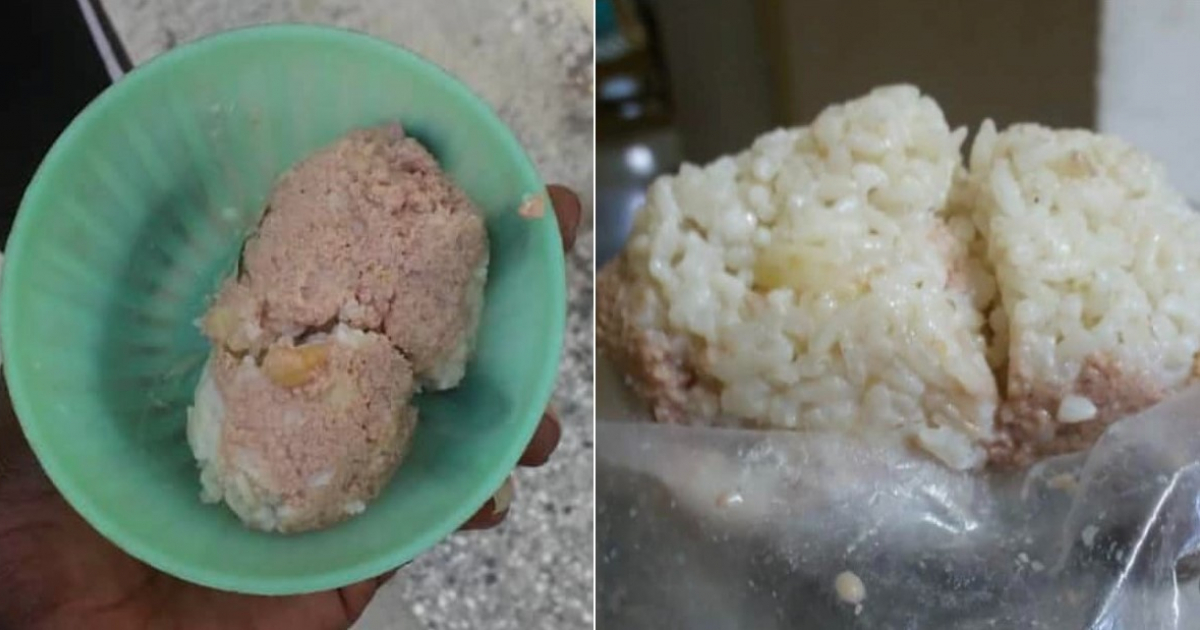
Related videos:
Relatives of political prisoners and opposition activists have reported a drastic reduction in food supplies in Cuban prisons, putting inmates at risk, who are already suffering from serious nutritional deficiencies.
The situation has worsened in various prisons across the country, where there is a drastic reduction in already limited food rations, leading to concern and protests among inmates and their families, reported the station Martí Noticias.
On January 6, the reduction of rations became evident in several prisons, including the Combinado del Este, the highest security prison in Havana, and the 1580 prison, also located in the Cuban capital.
José Díaz Silva, exiled opposition leader and president of the Opposition Movement for a New Republic, reported in statements to the mentioned media that prisoners have informed their families that food portions have been reduced.
"From a cup of rice that used to be 60 grams, they are now only giving them 50 grams," explained Díaz Silva, who noted that this information comes from members of his organization detained in those prisons.
In addition to the reduction in rations, the families of the inmates assert that overcrowding in the prisons has further exacerbated the food crisis.
Ilsa Ramos, wife of political activist Yasmany González, imprisoned in the Combinado del Este, confirmed the food shortages: “Yes, he says that it has been reduced because there are many prisoners and they don't have enough food. That began now in January,” Ramos stated.
In the women's prison of Guatao, also in the capital, a similar decrease in food rations is reported.
Luis Rodríguez, brother-in-law of the political prisoner and writer María Cristina Garrido, reported that the amount of rice has decreased and stated that the food conditions are part of a strategy to subdue the inmates. "It's to starve them," Rodríguez asserted.
The food crisis in Cuban prisons is not new. In April 2024, the Center for Documentation of Cuban Prisons raised concerns about the poor quality of food, the lack of main dishes, and the small portions.
Independent journalist Carlos Michael Morales, released last year after serving a two-and-a-half-year sentence for his involvement in anti-government protests on July 11, described similar conditions, including inadequate food and shortages of basic products like soap and toothpaste.
"For breakfast, we have boiled herbs, practically without sugar, and they serve a mixture that smells terrible, small portions of food. Sometimes they give a bar of soap for bathing, but that doesn't last for the whole month, and a tube of toothpaste is provided every 3 to 5 months," he detailed.
Also in March, the independent artist Luis Manuel Otero Alcántara, who was jailed during the same protests, told the independent media outlet El Estornudo that the food served in prison is "pathetic."
"You wake up at six in the morning and breakfast is terrible. Imagine, in a country where children currently don’t have milk or bread, what is left for a prisoner? Lunch is at eleven in the morning and dinner is at six in the evening, all in extremely poor conditions," he described.
On Friday, the non-governmental organization Cubalex reported that during the year 2024, it recorded a total of 1,559 human rights violations committed against detained individuals in Cuba.
Highlighting figures of arbitrary arrests, violence, and harassment, the annual report presented by the NGO based in the United States indicates that repression on the island remains systematic and profoundly impacts those facing violations of their fundamental rights.
Frequently Asked Questions about the Food Crisis in Cuba's Prisons
What is the current situation of food in Cuban prisons?
The current situation is critical, with a drastic reduction in food rations in several prisons, such as Combinado del Este and prison 1580 in Havana. The decrease has sparked protests among the inmates and concern among their families.
How does the food crisis affect prisoners in Cuba?
The food crisis worsens the health conditions of inmates, who are already suffering from nutritional deficiencies. The reduction in food and overcrowding in prisons exacerbate the situation, putting the lives of prisoners at risk.
What do the relatives of political prisoners in Cuba report?
Family members report that the reduction of food is part of a strategy to subdue the inmates. Additionally, they accuse the regime of medical negligence and of maintaining inadequate living conditions that affect political prisoners.
What other conditions do prisoners face in Cuban jails?
In addition to poor nutrition, prisoners face lack of basic hygiene products and inadequate medical care. These conditions have been reported by released journalists and activists such as Luis Manuel Otero Alcántara.
What measures have been taken internationally regarding this crisis?
The international community has expressed concern and has urged the Cuban regime to improve the conditions of prisoners and halt systematic repression, although effective measures remain limited.
Filed under: